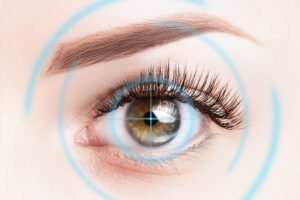
When it comes to medical interventions regarding vision, cataract surgery is one of the most common procedures. When contact lenses or glasses can’t help clear blurry vision, this is the only procedure you may need to have to get your sight back.
The surgery includes removing the affected lens from the eye and adding an artificial lens that will help you see crystal clear again. It usually doesn’t take more than an hour per eye, but cataract surgery aftercare might take up to two weeks.
One of the common side effects is post-cataract surgery floaters, and many people are concerned that they’re a sign of something being wrong.
Here we’ll cover topics of cataract prevention, what cataract surgery looks like, and cataract surgery aftercare. We’ll also talk about cataract surgery floaters and what they are. Once you read through this article, you’ll understand what floaters are and whether you should be concerned if you notice one of the side effects after the surgery.
What Are Floaters After Cataract Surgery?
Floaters are much more common than people think, but they appear more often after cataract surgery. The connection between cataracts and floaters is that there has been a change in your eyes.
Floaters appear as dark gray or black shadow-like spots, strings, or web. They are most visible when one is looking at a bright background, such as a light-colored wall or sky. The thing about them is that they seem like they’re constantly moving, and if you try to focus on them, they’ll slowly move out of your vision.
Some of the most common reasons why floaters appear are age, eye inflammation, cataract surgery, diabetes, and physical trauma.
What’s the Best Cataract Prevention?

Cataracts form with age, and a few reasons are commonly to blame. Previous eye surgery, use of steroids, injury, and diabetes are just a few reasons why people get a cataract.
Even though people commonly suffer from cataracts after they reach a certain age, there are certain things you can do when it comes to cataract prevention. A few of them include the following:
- Regular eye examination
- Quit smoking and drinking alcohol
- Having a healthy, low-sugar diet
- Wear quality sunglasses
Most eye-related health issues don’t happen overnight. Those that do indicate you should visit your ophthalmologist, but others take time to develop. Visiting your ophthalmologist once every year or two years is the best cataract prevention because they’ll be able to notice any issues in the earliest stage. This will allow treating any problem quickly.
Bad habits such as smoking cigarettes or drinking alcohol also improve the chances of developing cataracts. Quitting these bad habits is not only cataract prevention, but it will improve your overall health quickly.
What you put inside your body in terms of food is directly related to your overall health. Eating too many sugary foods and beverages can lead to obesity, diabetes, and other health issues. Cataracts and floaters are just one of many health issues you can experience if you don’t care what you eat and drink. A well-balanced diet will give you all the nutrients your body needs to function optimally.
Also, although wearing sunglasses seem like a trendy accessory, the high-quality UV protection will protect your eyes from various external factors such as sunlight, dust, and debris.
How to Know That You Need Surgery and What to Do if You Experience Floaters After Cataract Surgery
If you have a cataract in your eye, you’ll certainly need to have surgery sooner or later. Cataracts and floaters are issues that gradually progress, but if left untreated, they can lead to more complicated problems that are much more difficult to treat.
Blurred vision, sudden changes, fast vision deterioration, noticeable differences in colors, and halos around light during the dark are all signs that cataracts have progressed to the point you’ll need cataract surgery.
Floaters after cataract surgery are a common side effect that most people experience, but they should disappear after a while. If you’re seeing more floaters than you might think is normal, feel free to schedule an appointment with Diamond Vision Lasik Center.
The question of how to get rid of eye floaters after cataract surgery is something most people ask following such an intervention. Unfortunately, there’s no way to speed up the process of getting rid of them, but following cataract surgery aftercare recommendations will surely help your eyes heal faster. Suppose you experience a lot of cataract surgery floaters. In that case, it’s important to let your doctor know as soon as possible because they are a sign of a tear in the retina of the eye, which is an issue commonly hidden behind cataracts, and hard to diagnose if one has cataracts. Only after the cataracts are removed can the ophthalmologist detect this.
Look For the Signs

It’s only natural to be concerned if you experience even the slightest side effects after surgery. When it comes to vision, it’s one of the most important senses, and it’s normal for people to panic if they experience the unfamiliar.
Removing cataracts clears vision, but the eyes need time to get adjusted to seeing things. Floaters are just more visible after surgery, even though they were there before the cataracts were removed. They gradually disappear, so it’s not something you should be concerned about right away.
On the other hand, they can signify that something is wrong if the number of floaters drastically increases after surgery. This is a sign that there’s a tear in the retina, and it’s of the utmost importance to check in with your doctor and clearly describe everything you’re experiencing in detail. After the checkup, your ophthalmologist will recommend the next steps of treatment.
If you follow the tips we shared about preventing cataracts from appearing, you probably won’t need to worry about post-op side effects. With regular checkups at Diamond Vision Lasik Center, any type of issue will be found in the earliest stages, and the success of the treatment will be much more significant.
In most cases, floaters are just a short-lived side effect that perishes after a while, as soon as your eyes get used to the new and improved vision. If you notice improvement regarding the number of floaters you’re aware of, everything is healing as planned. If you notice any discomfort, discoloration, or a sudden increase in floaters after cataract surgery, make sure to check in with your ophthalmologist.
If we cleared some of your questions about floaters, or you think someone would benefit from reading our article, share it with your friends and family on social media.
Contact Us
If you have more questions about LASIK procedures, get in touch with us.
Related Blogs

Timing is Everything: When to Consider LASIK After Nursing for Optimal Results
Timing is everything when considering LASIK eye surgery after nursing, and understanding the optimal period for this procedure is vital for both mother and baby.

Cataract Surgery: Restoring Clarity and Confidence
Cataract surgery is a transformative procedure that offers a new lease on clear vision and renewed confidence. As cataracts cloud the eye’s lens, causing blurred

Intralase LASIK Explained: What to Expect Before, During, and After the Procedure
Intralase LASIK is a cutting-edge procedure that offers a safe, effective, and precise way to enhance vision compared to traditional LASIK methods. Understanding what to
